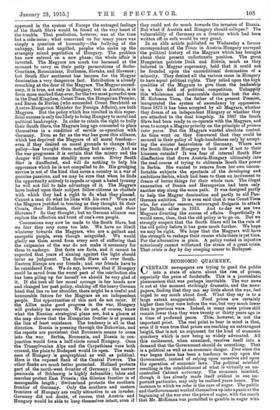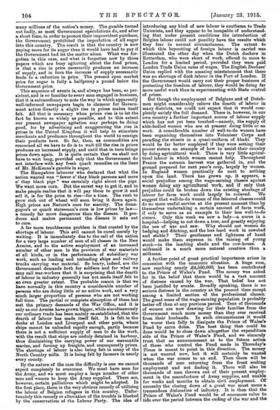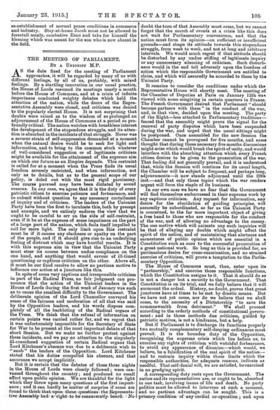ECONOMIC QUACKERY.
CERTAIN newspapers are trying to goad the public into a state of alarm about the rise of prices, especially the price of foodstuffs. This is a journalistic phenomenon that was perhaps inevitable. The war news is not at the moment strikingly dramatic, and the news- papers, finding that they can say little about the war, feel urged to say much about food. What they say is to a large extent exaggerated. Food prices are certainly higher than they were before the war, but very much lower than in previous wars. Indeed, in many cases prices still remain lower than they were twenty or thirty years ago in a time of profound peace. This, however, is not the important point. The real point to bear in mind is that, even if it were true that prices are reaching an extravagant height, that is not an argument for the kind of economic quackery which is now beicg so widely advocated. All this excitement, when examined, resolves itself into a demand that the Government should do something. That is a political as well as an economic danger. Ever since the war began there has been a tendency to rely upon the Government, instead of relying upon ourselves and upon the operation of economic laws. The political mischief resulting is the establishment of what is virtually an un- controlled Cabinet autocracy. The economic mischief. though it has already made itself evident in one im- portant particular, may only be realized years hence. The instance to which we refer is the case of sugar. The public and the Government worked themselves up into a panic at the beginning of the war over the price of sugar, with the result that Mr. McKenna was permitted to gamble in sugar with
many millions of the nation's money. The gamble turned out badly, as most Government speculations do, and after a short time, in order to protect their improvident purchase, the Government prohibited the importation of all sugar into this country. The result is that the country is now paying more for its sugar than it would have had to pay if the Government bad let the matter alone. What was for- gotten in this case, and what is forgotten now by those papers which are busy agitating about the food prices, is that a rise in price necessarily produces an increase of supply, and in turn the increase of supply necessarily leads to a reduction in price. The present open market price for sugar is fully a halfpenny a pound below the Government price.
Thie sequence of events is, and always has been, so per- sistent, and is so familiar to every man engaged in business, that it is extraordinary to note the way in which apparently well-informed newspapers begin to clamour for Govern- ment action directly a slight rise in prices makes itself felt. All that is necessary when prices rise is to let the fact be known as widely as possible, and to this extent our present newspaper agitation may perhaps be doing good, for by advertising and exaggerating the rise in prices in the United Kingdom it will help to stimulate merchants and producers throughout the world to consign their products here. So far, then, an commodities are concerned all we have to do is to wait till the rise in prices produces an increased supply, and until that in turn brings prices down again. It is quite certain that we shall not have to wait long, provided only that the Government do not interfere with any fresh quack remedies on the lines of Mr. McKenna's gamble in sugar.
The Hampshire labourer who declared that what the nation wanted was "fewer o' they black parsons and more o' they black pigs " was certainly right about the pigs. We want more corn. But the surest way to get it, and to make people realize that it will pay them to grow it and sell it, is for the price to rise—for a time. The rush to grow rich out of wheat will soon bring it down again. High prices are Nature's cure for scarcity. The dema- gogue's or quack statesman's cure is low prices by law- s remedy far more dangerous than the disease. It pro- duces and makes permanent the disease it sets out to cure.
A far more troublesome problem is that created by the shortage of labour. This evil cannot be cured merely by waiting. It is immediately due to the call of the nation for a very large number of men of all classes in the New Armies, and to the active employment of an increased number of other men in the provision of war materials of all kinds, or in the performance of subsidiary war work, such as loading and unloading ships and railway trucks carrying war material. So heavy, indeed, are the Government demands both for soldiers and for what we may call war-workers that it is surprising that the dearth of labour in industry generally has not made itself felt to an even greater extent. The probable reason is that we have normally in this country a considerable number of persons who are doing little or no active work, and a very much larger proportion of persons who are not working full time. The partial or complete absorption of these has met the primary demands of the War Office, and it is only as our Armies have grown bigger, while simultaneously our ordinary trade has been mainly re-established, that the dearth of labour has made itself felt. It is felt in the docks at London and Liverpool and other ports, where ships cannot be unloaded rapidly enough, partly because there is not a sufficient supply of men to do the work, with the result that ships are unduly detained in harbour, thus diminishing the carrying power of our mercantile marine, and forcing up freights, and consequently prices. The shortage of labour is also being felt in many of the North Country mills. It is being felt by farmers in nearly every county.
By the nature of the case the difficulty is one we cannot expect completely to overcome. We must have men for the Army, and we must employ a large number of other men and women to keep the Army supplied. There are, however, certain palliatives which might be adopted. In the first place, there is the very obvious remedy of utilizing the labour of Belgian refugees in this country. Unfor- tunately this remedy or alleviation of the trouble is blocked by the conservatism of the Labour Party. The ides of
introducing any kind of new labour is anathema to Trade Unionists, and they appear to be incapable of understand- ing that under present conditions the introduction of Belgian labour could not possibly have the results which they fear in normal circumstances. The extent to which this boycotting of foreign labour is carried was illustrated the other day when the Dutch dockers in Rotterdam, who were short of work, offered to come to London for a limited period, provided they were paid London Trade Union rates of wages. The English Dockers' Union replied with the amazing misstatement that there was no shortage of dock labour in the Port of London. If the Government would carry out their proper business of protecting the freedom of labour, they would be doing far more useful work than in experimenting with State control of prices.
But though the employment of Belgians and of Dutch- men might considerably relieve the dearth of labour in many districts, we could not expect that it would com- pletely satisfy the full demand. There is, however, in our own country a further important source of labour supply which has not yet been touched—namely, the supply of able-bodied women who are at present doing little or no work. A considerable number of well-to-do women have been organizing themselves into Volunteer Corps and parading the streets in a quasi-uniform of khaki They would be far better employed if they were setting their poorer sisters an example of how to assist their country by doing agricultural work. There is very little agricul- tural labour in which women cannot help. Throughout France the autumn harvest was gathered ill, and the ground prepared for next year's crop, largely by women. In England women practically do next to nothing upon the land. There has grown up, it appears, a, social prejudice among the wage-earning classes against women doing any agricultural work, and if only that prejudice could be broken down the existing shortage of labour for farm work could largely be relieved. We suggest that well-to-do women of the leisured classes could do no more useful service at the present moment than by themselves undertaking a certain amount of farm work, if only to serve as an example to their less well-to-do sisters. Only this week we saw a lady—a nurse in a. hospital—helping to cut down a tree, and greatly enjoying the use of axe and saw. Why should not women do hedging and ditching, and the less hard work in cowshed and stable ? Their gentleness and lightness of hand would make them supreme in the raising of young stock—in the lambing sheds and the cow-house. A milkmaid is a much more natural creature than a milkman.
A. further point of great practical importance arises in connexion with the economic situation. A huge sum, now reaching nearly .£4,500,000, has been contributed to the Prince of Wales's Fund. The money was asked for in the belief that there would be a vast amount of distress caused by the war. That belief has not been justified by events. Broadly speaking, there is no serious distress in the country at the present time except among a limited section of the professional classes. The great mass of the wage-earning population is probably better off than at any previous period. Tens of thousands of women are now drawing for their families from the Government much more money than they ever received from their husbands. In such circumstances it would be worse than folly to dissipate the Prince of Wales's Fund by extra doles. The best thing that could be done would be to close down altogether the expenditure side of the Prince of Wales's Fund, and we sincerely trust that an announcement as to the future action of those who control the Fund made in Thursday's Times is meant to point in this direction. The money is not wanted now, but it will certainly be wanted when the war comes to an end. Then there will be thousands of men returning from the front seeking employment and not finding it. There will also be thousands of men thrown out of their present employ- ment in the manufacture of Army supplies, and unable for weeks and months to obtain civil employment. Or necessity the closing down of a great war must mean a. tremendous dislocation of industry. It is then that the Prince of Wales's Fund would be of enormous value to tide over the period between the ending of the war and the
re-establishment of normal peace conditions in commerce and industry. Stay-at-home Jacob must not be allowed to forestall manly, combative Esau and take for himself the blessing which was meant for the son who is now absent in the field.




































 Previous page
Previous page